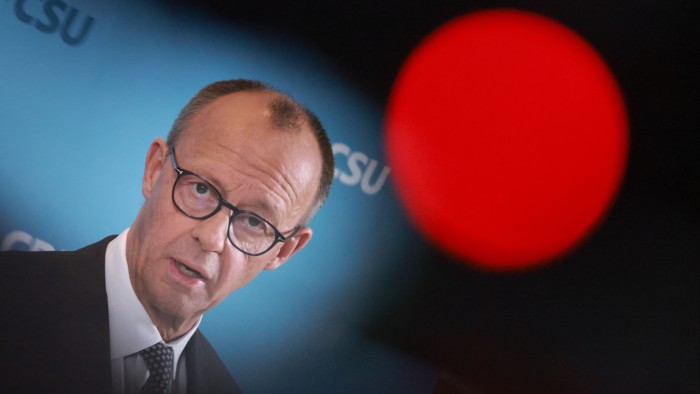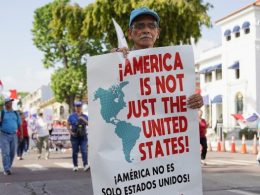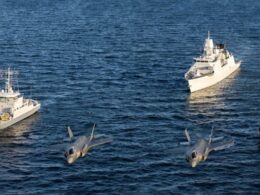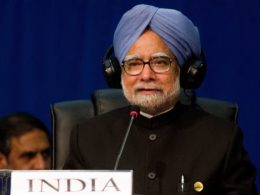Unlock the White House Watch newsletter for free
Your guide to what the 2024 US election means for Washington and the world
The writer directs the Center on the US and Europe at the Brookings Institution
Rarely has a man who has worked so long to reach the pinnacle of his ambition been dealt such a difficult hand when he got there. Friedrich Merz lost three bids for national power between 2000 and 2020 before finally winning Germany’s parliamentary elections on Sunday. Yet the 69-year-old leader of the Christian Democrats, now in line to be Germany’s next chancellor, finds himself surrounded by a daunting array of domestic and foreign crises and adversaries — the most confounding of which might be President Donald Trump’s America.
Westbindung, or cleaving to the west: for 80 years, there was no stronger article of faith for German conservatives (and not just them). Konrad Adenauer, Germany’s first post-second world war chancellor, took the lead in seeking to anchor occupied western Germany to America and the older European democracies. He hoped that Germany, as a member of Nato and what evolved over time into the EU, would become an essential member of a US-led western community based on shared values, trade and security.
Westbindung was centred on a close bilateral relationship with the US that by no means excluded bullying and condescension by America or freeriding and hypocrisy by the Germans. American hard power hubris, German soft power delusions: both parties were often guilty as charged.
But for many decades the US has found Germany to be a reliable partner, most recently in supporting Ukraine’s defence against its Russian aggressor. And Germans will never forget that America rescued us from ourselves in 1945, protected us throughout the cold war and, after the fall of the Berlin Wall in 1989, benevolently oversaw the democratisation and integration of most of Europe.
Trump’s America, however, appears to have a very different kind of relationship in mind. Senior figures of the hard-right Alternative for Germany (AfD) party were invited to the inauguration in Washington. Elon Musk campaigned for the AfD several times. Vice-president JD Vance told a hushed audience at the opening of the Munich Security Conference that the greatest threat to Europe was not the brutal Russian bombardments of Ukraine, or Russian disinformation and sabotage in Nato member states, but the “threat from within”.
Vance poured scorn on the “firewall” agreement among Germany’s centrist parties that they will not work with an openly pro-Kremlin party that flirts with neo-Nazi language and ideas, and that has been formally registered by Germany’s domestic intelligence services as in part extremist. This, Vance explained, was suppression of political dissent.
It all brought to mind a famous passage in George Orwell’s 1984: “War is peace. Freedom is slavery. Ignorance is strength.” For those present — myself included — it was clear that an era had just ended.
Merz, an impassioned European and lifetime Atlanticist, told a national television audience after his victory on Sunday that it would be his “absolute priority” to help Europe “achieve independence from the USA”. He suggested that Nato in its current form might no longer exist by June, when the alliance is due to hold a summit in the Netherlands. Only a few days earlier, he had said it might be time for Germany to participate in a European nuclear deterrent with France and the UK.
The incoming chancellor’s outrage is as understandable as it is astonishing. After all, the Trump administration has in just four weeks overturned 80 years of post-second world war American foreign policy by treating its allies like vassals and cosying up to its adversaries. On Monday, it voted with Russia and against Ukraine and European countries at the UN on an issue of Europe’s security for the first time since 1945. Twice.
But what is required is action, not anger; and a security severance from the US or a European nuclear deterrent are unrealistic goals. Merz wants to conclude coalition negotiations with the Social Democrats by Easter, which falls in the second half of April. He must try to launch a massive increase in defence funding and reanimate Germany’s relationships with its European partners.
He has to help forge a Europe-wide plan to support Ukraine, crank up the continent’s defence industry, boost its competitiveness, reduce its dependencies and make its societies resilient against attack — from enemies domestic and foreign. The challenge is immense, as are the risks. It is the only way to regain America’s respect, even if the friendship is lost for now.
Source link









